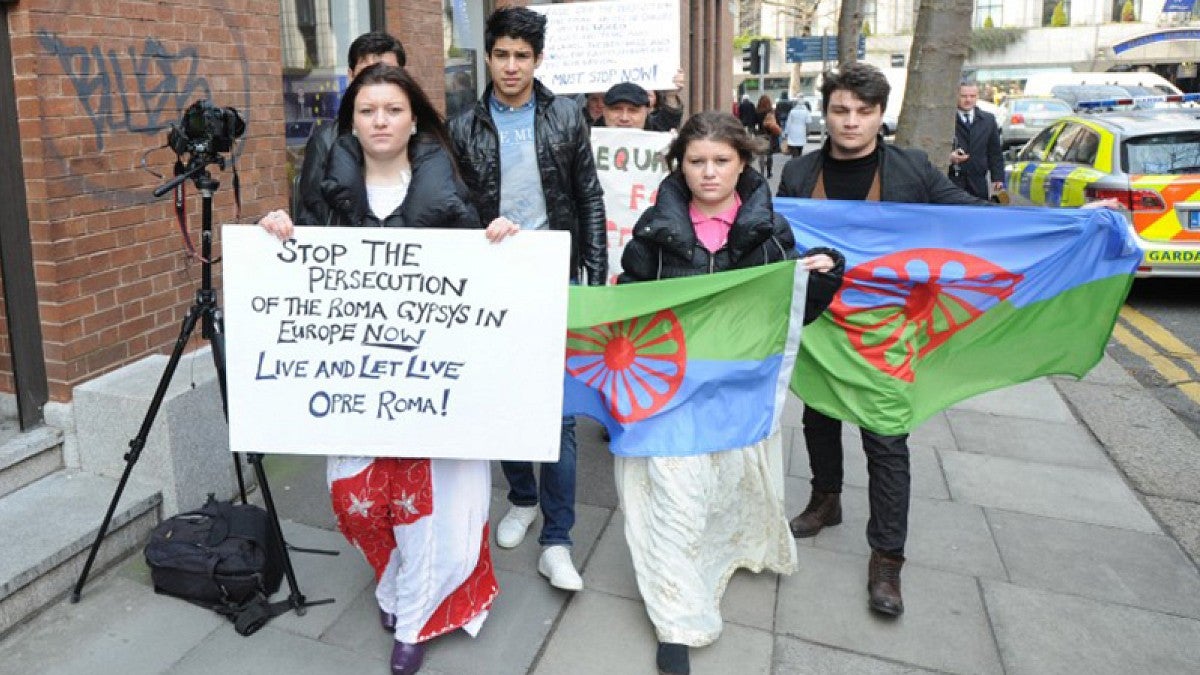“INVADED!!” screams a flier on the computer screen of UO anthropologist and folklorist Carol Silverman.
“There is no city in America that is safe!” it warns, in an attempt to recruit law enforcement officers to a training that promises to educate them “in the ways of the criminal element of the Traveler and Gypsy communities”.
“This training is targeting an entire ethnic group,” said Silverman, whose research is focused on Roma, the accepted name for the group often referred to as Gypsies. “This is racial profiling.”
Silverman has studied and written about Roma people and the prejudices against them for nearly four decades and has won numerous fellowships and awards for her contributions to the field. Inspired by their rich culture, she quickly developed a parallel interest in their everyday lives and the prejudice and fear they face around the globe.
Silverman said police training is one of many examples of discrimination against Roma, a group that numbers about 12-14 million worldwide. Other forms of discrimination include unemployment rates above 80 percent in Eastern Europe, schools classifying Roma youth as mentally handicapped at rates 27 times greater than other ethnicities in the Czech Republic, and legislation outlawing cultural practices like fortunetelling in the U.S. She was first introduced to Roma when she embarked on a “pilgrimage” to the Balkans after teaching herself how to translate the lyrics to the Balkan songs she loved for folk dancing. She soon developed an academic interest in Roma music and culture, which quickly evolved into a desire to understand their political reality, as she found it difficult to separate the two.
“I realized the music I was enthralled with in Bulgaria was prohibited,” Silverman said, explaining that Roma music was outlawed and their artists imprisoned during the socialist period when she started her research.
Roma people have been battling racism for hundreds of years — they were enslaved and traded in Romania until the mid-19th century and then killed by the hundreds of thousands during the Holocaust — something most Europeans and Americans remain unaware of.
Silverman was exposed to elements of the racism against Roma as soon as she began her research in Bulgaria.
“Colleagues would warn me not to venture into Roma settlements because they were certain I would be robbed or killed,” she recounted, describing her early fieldwork. “Which was ridiculous, as I was simultaneously meeting and working with so many kind and hospitable Roma.”
The focus of some of her latest work and current book project is on the word “Gypsy” and its cultural appropriation in society.
“People’s association with the term ‘Gypsy’ is fiercely divided into two stereotypes,” she said. “One, a romantic vision that celebrates their music and culture. And another that criminalizes the group.”
She said the criminalization of Roma people continues to cripple their economic status, citing frequent instances of potential employers and landlords who hear “Gypsy” and deny them jobs or housing because of prejudice.
“In addition to having to endure historical stereotypes, Roma recently became scapegoats for the ills of communism in Europe,” Silverman said. “They’ve been targeted by the violence and xenophobia that developed from the hunt for ‘others’ after the collapse of communism.”
Silverman explains that some nations in Europe label Roma refugees as “unworthy,” while others deport them at what she argues are alarming rates, including 28,000 Kosovo Roma extradited from Germany over a three-year period.
In the United States, Roma have rarely been granted refugee status, despite facing ample racial violence and systemic discrimination in Europe. Such incidents have been detailed in European reports addressing the anti-Roma hate crimes that have spurred an influx of asylum seekers to the United States.
“Even the Pacific Northwest has an ugly history with denying Roma people a place to live,” Silverman said. “In 1944, the mayor of Portland forced gas rations on the entire population so they would drive away, and never return, because the city considered them foreign and dangerous.”
Some American Roma have elected to remain hidden and undocumented, which has caused a slew of other legal and economic problems, as has their culture’s propensity for oral record keeping over written documentation for events like births and marriages.
“There are families who have lived in the United Stated for several generations, but lack the documentation to prove it,” she said.
Their history as a nomadic group has also proven problematic in the United States. Some Roma have been accused of child abuse and have lost their children to the foster care system because they’ve been deemed unfit to parent.
Silverman has served as an expert witness in local court cases considering matters like parental rights and whether oral testimony is equivalent to a birth certificate. She has also helped individuals with the legal process for seeking asylum.
After Silverman realized just how widespread the xenophobia against Roma is, she expanded her work to include advocacy so she can help bring an end to the violence and persecution against Roma. Silverman hopes her research will help shape future policies and improve people’s understanding of Roma and the prejudices they face.
“Historically, their culture has not been one that aggressively defends their people and human rights,” she explained. “But after generations of injustice, that’s starting to change as younger Roma begin to demand fair treatment.”
—By Emily Halnon, University Communications


